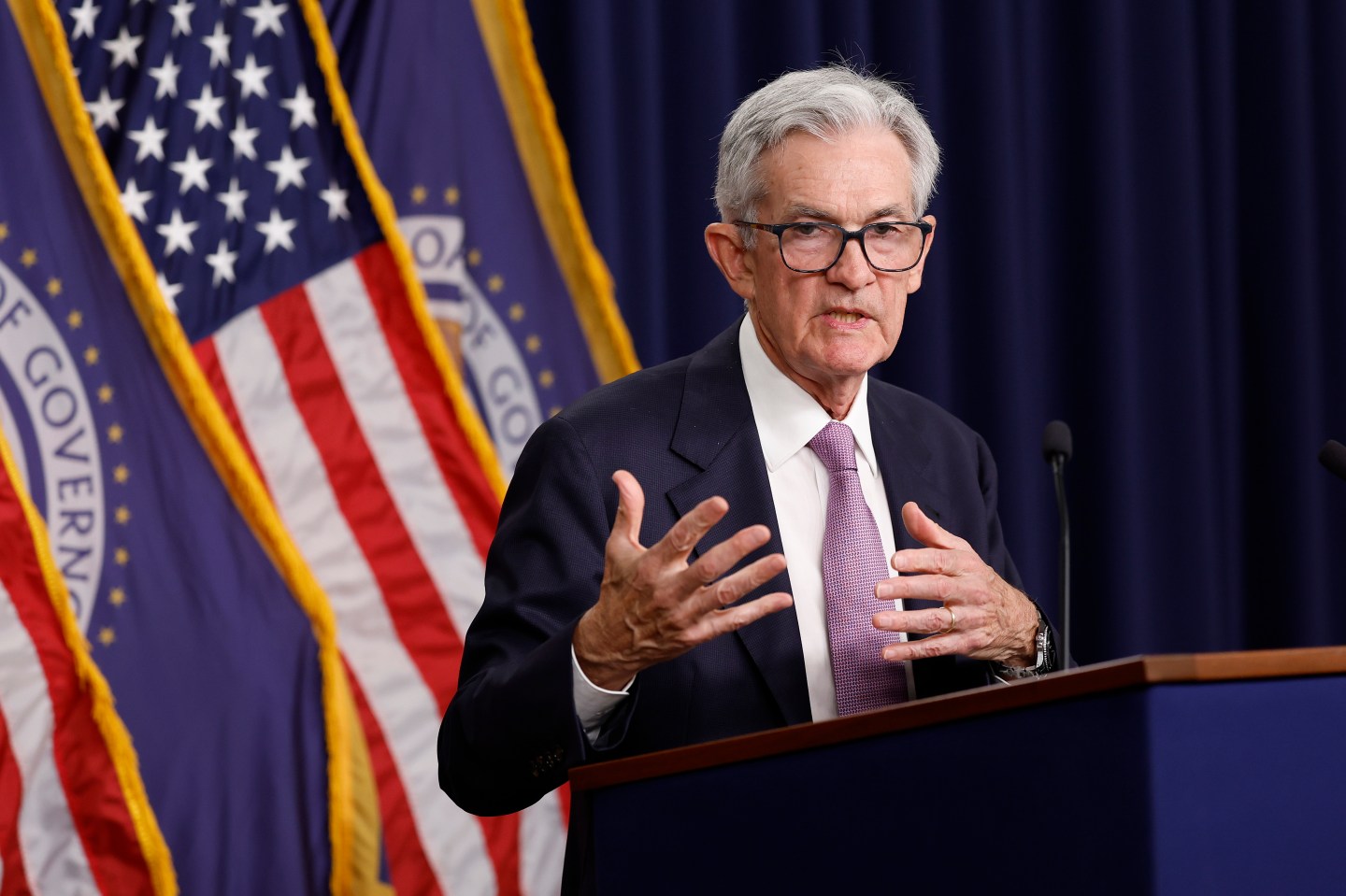Good morning. Thirteen years ago this week, Netflix rebranded its movies-by-mail service Qwikster.
Then-CEO Reed Hastings saw the streaming revolution coming and shoved his Netflix-branded chips into the pile. Three weeks later he conceded that splitting the streaming and physical media businesses was too, well, hasty and backtracked.
It all worked out: Netflix earnings today are 10X what they were then.
The company still owns the Qwikster.com domain, by the way. As the maxim goes: Every man has a price. —Andrew Nusca
P.S. Colin Kaepernick is coming to Fortune’s Brainstorm AI conference, Dec. 9-10 in San Francisco. Register your interest here.
Want to send thoughts or suggestions to Data Sheet? Drop a line here.
Tech stocks do the JPow two-step

You know that feeling when you click something on your laptop screen and it takes a few seconds before anything actually happens?
That’s sort of how tech stocks reacted to the Federal Reserve’s rate cut, initially shrugging off the news and then running off to the races.
Apple, Nvidia, and Meta all notched gains of nearly 4% Thursday, while Tesla surged by more than 7%. The “Magnificent Seven” stocks (I miss the simplicity of FAANG) added about $500 billion to their market caps collectively, while at least 45 notable tech companies saw their stock go up at least 2% in a broad market rally that pushed the S&P 500 and the Dow to fresh highs.
The lower borrowing costs (Wednesday’s half-point cut marked the Fed’s first cut to interest rates in more than four years) is music to the ears of tech investors at a time when the industry is experiencing an AI gold rush that requires massive investments in infrastructure and other assets.
The ultimate return that tech companies will reap from this AI spending spree is still unclear. After mulling it over for a day, however, tech investors seem to have concluded that…it doesn’t matter! And with the Fed is expected this year to cut rates again, tech companies will get another chance to grow their market caps and please investors. —Kali Hays
EU to Apple: Shape up or pay up
Batten down the hatches, there’s more antitrust news out of Europe.
EU watchdogs on Thursday warned Apple that it must open its mobile operating systems to third parties within six months or face substantial fines.
The enforcement comes under the Digital Markets Act, which aims to ensure outside developers can make their software compatible with features like the Siri digital assistant or the payment chip. (Under pressure, Apple said it would allow the latter last month…for a fee.)
How much could the EU fine Apple if a formal probe didn’t like the cut of Apple’s jib? Up to 10% of global annual sales. Yikes.
Waters have been choppy lately between the American phonemaker and European regulators. Apple is currently under a separate investigation into its App Store rules for developers that could lead to fines.
And when the company rolled out its flagship iPhone 16 with features like Apple Intelligence, iPhone Mirroring, and SharePlay Screen Sharing, it didn’t make them available in European handsets thanks to the DMA’s interoperability requirement.
Shots fired, as they say. —AN
Elon Musk goes ballistic
Elon Musk has added yet another enemy to his already long list: the Federal Aviation Administration.
The regulator on Tuesday proposed fining his space cargo company SpaceX $633,000 for violations stemming from two rocket launches in 2023. In one instance, SpaceX allegedly used an unapproved launch control room. In another, it’s accused of using unapproved storage for rocket propellant. (Like we said: Ballistic.)
In a statement, the FAA said failure “to comply with the safety requirements will result in consequences."
Musk, rarely one to quietly accept consequences, predictably erupted about the proposed fine on X, his social media service. In a series of posts, Musk accused the FAA space division of “harassing SpaceX about nonsense that doesn’t affect safety” and called for the FAA’s leadership to resign, adding that he’s “highly confident” the penalties come from “politically-motivated behavior.”
The FAA has wisely avoided responding to Musk’s attack. But Billy Nolen, former acting administrator of the FAA, denied the accusations, telling TechCrunch that the regulator “is about as apolitical as it gets.” —Jenn Brice
The big tech companies have eyes
The U.S. Federal Trade Commission has published a new report outlining how “social media and video streaming companies harvest an enormous amount of Americans’ personal data and monetize it to the tune of billions of dollars a year,” writes chair Lina Khan.
Surprising? Only if you’ve been ignoring the news cycle since Barack Obama took office.
According to the report, Big Tech watches what we do on and off their platforms and freely trades our data with little regulation. Without "significant action, the commercial surveillance ecosystem will only get worse," it adds.
Many jurisdictions—from Europe to California—have adopted laws to tackle such concerns. But the U.S., which many of these companies call home, lacks a federal solution. (In the words of fictional film star Moira Rose: What have we done?)
Could the FTC report convince U.S. lawmakers to pass the country’s first comprehensive federal privacy legislation? We’ll first see what happens in November. —David Meyer
Your next Waymo might be a Hyundai
With new 100% U.S. tariffs on Chinese EVs taking effect later this month, Waymo is reportedly looking for an alternative to its existing partnership with a Chinese EV automaker.
The Alphabet-owned robotaxi company is in talks with Hyundai to outsource manufacturing of its self-driving vehicles for the U.S. market, according to a report in the South Korean newspaper Electronic Times. (Waymo declined to comment.)
Waymo originally intended to put the sixth generation of its autonomous driving tech in sleek and roomy vehicles made by Zeekr, which is owned by Geely and based in Ningbo. Now Waymo Driver, as it’s called, may end up in Hyundai’s Ioniq 5.
If this all sounds familiar, that’s because Uber linked up with Hyundai’s Motional in 2022 for its own robotaxi service. But as Waymo chief product officer Saswat Panigrahi told me earlier this year: Waymo was watching “that tariff situation.” And now it’s making moves. —Jessica Mathews
More data
—Intel won't sell Mobileye majority stake. Traders were worried it might divest the self-driving car company; now they’re buying the dip.
—Nintendo, Pokémon sue parody game maker. Equipping cute, vaguely familiar creatures with guns may have been a factor.
—Secret Service probing Elon Musk posts. Turns out jokes are WAY less funny if they’re about killing a head of state.
—Anduril, Microsoft team up on combat goggles. The Pentagon might spend $22 billion on headsets in the next decade, or about one-ninetieth the lifetime cost of the F-35.
—The tech talent bubble has popped. Unless your BA or BS is an LLM. Obviously!













